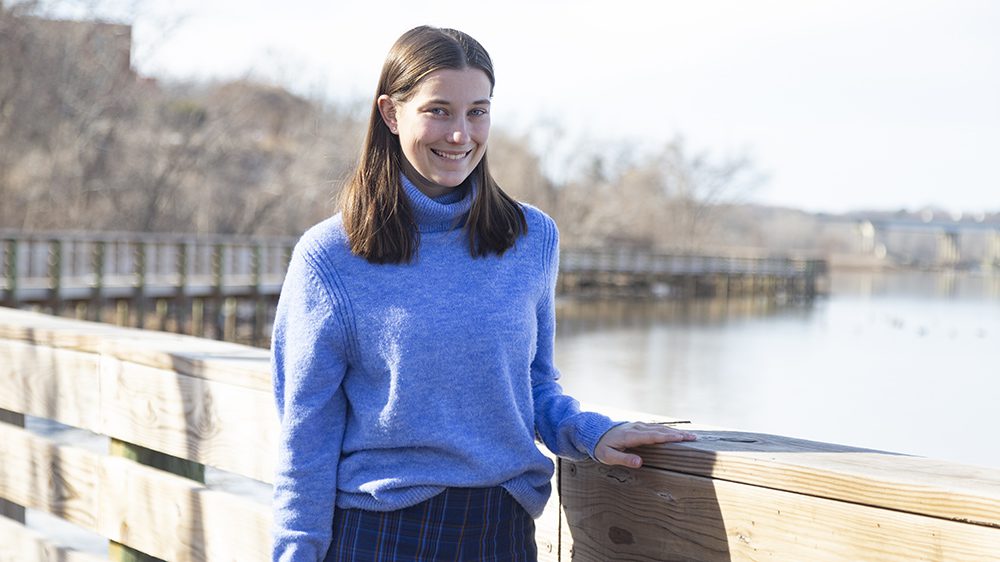Partin ’17 Focuses on Environment, Local Community

Allison Partin '17—Photo by Micalyn Miller, VMI Alumni Agencies.

Allison Partin '17—Photo by Micalyn Miller, VMI Alumni Agencies.
“I was always trying to help the community in some way, shape, or form.” That’s what Allison Partin ’17 had to say about her cadetship—four years that were filled with service projects done in conjunction with the VMI chapter of Engineers Without Borders, including a trip to Bolivia to improve water quality for villagers there, as well as involvement with the American Society of Civil Engineers and serving as the S5 in charge of public relations her 1st Class year.
In addition, her can-do spirit led her to complete an internship that many cadets might not have undertaken: One at the Buena Vista, Virginia, Wastewater Treatment Plant, where she ran water quality tests and inspected sludge daily.
Graduating as one of only four women in a class of 59 civil engineering majors, Partin didn’t let gender—or anything else—stop her from seizing opportunities to learn and serve.
“I was always trying to get off post and trying to do other things, like meet other people, do other things outside of VMI activities,” she recalled. “You know, I was always just trying to be extroverted and meet other people and make that connection.”
Now, five years out from graduation, Partin is working in the energy and utilities branch at Fort Lee in Prince George County, Virginia, where she’s continuing her commitment to environmental stewardship and putting her Master of Science degree in environmental engineering from Virginia Tech to good use.
Away from work, she’s involved with the James River Ball Patrons Committee. Since 1964, the committee has provided over $300,000 in funding to enrich the arts and cultural education of students in Hopewell City Public Schools, a school district that serves a large population of minority and low-income students.
On a day-to-day basis, Partin often joins her brother, Johnny Partin ’14, on his “trash walks.” Using a hand-held grabber, the Partin siblings and others walk through the Tri-Cities of Virginia area—Hopewell, Colonial Heights, and Petersburg. In 2021, those “trash walks” resulted in the collection of approximately 20,000 pounds of debris.
"[VMI] really teaches you how to deal with those situations … and that you do have a place in this world. You just have to figure it out and how [it] is going to impact others and what kind of mark you want to make in the big picture.”
Allison Partin ’17
The walks are proof that giving back to one’s community doesn’t necessarily involve large amounts of money or specialized resources. “We just walk the streets, and we just pick up trash,” Partin commented. “You get your exercise. I walk my dog at the same time and make a difference for the community.”
Going forward, Partin would like to become a certified energy manager, which would recognize her as capable of optimizing a building’s energy performance and give her more leeway in seeking federal jobs. She’d also like to make more scholarships available to students in her area who are interested in community service and to make sure those scholarships are open to high schoolers who are headed for a two-year college or trade school, not just a four-year college.
For Partin, these goals tie back to the lessons she learned as a cadet: It’s not just about you—it’s about the job.
She hadn’t been on post long, Partin said, before she learned, “Don’t take things too seriously or too personally … You are a part of a bigger organization or a bigger thing than just yourself.”
And because of that, it’s possible to make a big impact on the world, even from a small corner of it.
“[The Institute] really prepares you for life outside of VMI,” she noted. “You’re always going to have those difficult people; you’re always going to have those sticky situations. You’re always going to be answering to somebody in some form or capacity. It really teaches you how to deal with those situations … and that you do have a place in this world. You just have to figure it out and how [it] is going to impact others and what kind of mark you want to make in the big picture.”

The development writer plays a key role in producing advancement communications. This role imagines, creates, and produces a variety of written communication to inspire donors to make gifts benefiting VMI. Utilizing journalistic features and storytelling, the development writer will produce content for areas such as Annual Giving, stewardship, and gift planning.